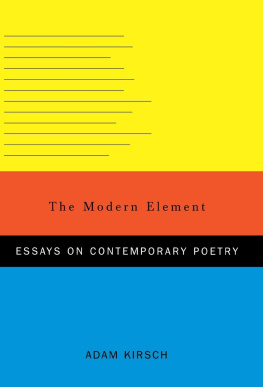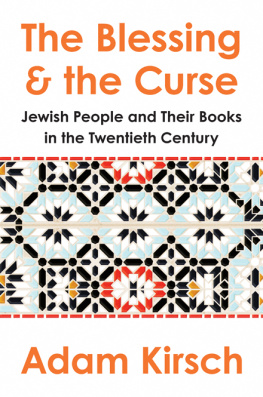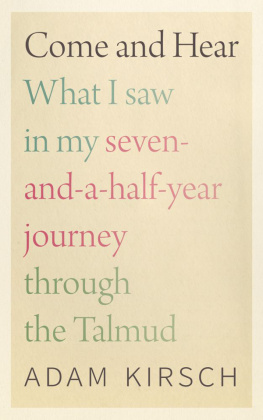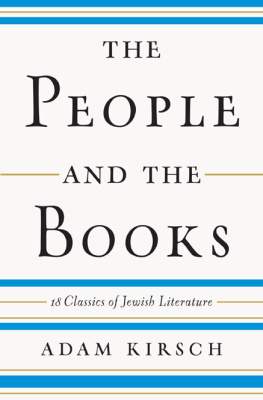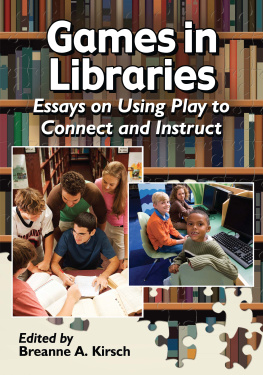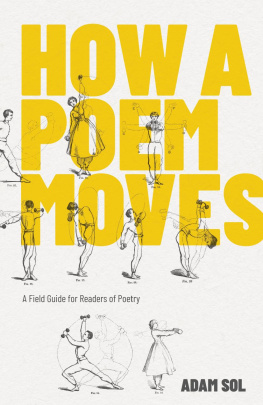Adam Kirsch - The Modern Element: Essays on Contemporary Poetry
Here you can read online Adam Kirsch - The Modern Element: Essays on Contemporary Poetry full text of the book (entire story) in english for free. Download pdf and epub, get meaning, cover and reviews about this ebook. year: 2008, publisher: W. W. Norton & Company, genre: Religion. Description of the work, (preface) as well as reviews are available. Best literature library LitArk.com created for fans of good reading and offers a wide selection of genres:
Romance novel
Science fiction
Adventure
Detective
Science
History
Home and family
Prose
Art
Politics
Computer
Non-fiction
Religion
Business
Children
Humor
Choose a favorite category and find really read worthwhile books. Enjoy immersion in the world of imagination, feel the emotions of the characters or learn something new for yourself, make an fascinating discovery.
- Book:The Modern Element: Essays on Contemporary Poetry
- Author:
- Publisher:W. W. Norton & Company
- Genre:
- Year:2008
- Rating:5 / 5
- Favourites:Add to favourites
- Your mark:
- 100
- 1
- 2
- 3
- 4
- 5
The Modern Element: Essays on Contemporary Poetry: summary, description and annotation
We offer to read an annotation, description, summary or preface (depends on what the author of the book "The Modern Element: Essays on Contemporary Poetry" wrote himself). If you haven't found the necessary information about the book — write in the comments, we will try to find it.
The Modern Element: Essays on Contemporary Poetry — read online for free the complete book (whole text) full work
Below is the text of the book, divided by pages. System saving the place of the last page read, allows you to conveniently read the book "The Modern Element: Essays on Contemporary Poetry" online for free, without having to search again every time where you left off. Put a bookmark, and you can go to the page where you finished reading at any time.
Font size:
Interval:
Bookmark:

Also by Adam Kirsch
The ThousandWells: Poems
The Wounded Surgeon:
Confession and Transformation in Six American Poets
The Modern Element
Essays on Contemporary Poetry
Adam Kirsch

W W Norton & Company
New York London
Adjusting type size may change line breaks. Landscape mode may help to preserve line breaks.
To Leon Wieseltier
IN 1857, Matthew Arnold delivered his inaugural lecture as Professor of Poetry at Oxford, later published as On the Modern Element in Literature. Like so many poets and critics since, Arnold was attempting to redefine the notion of modernness, expanding it from a merely temporal category to an aesthetic and even moral one. The modern element, he insists, is not to be found only in the poetry of the present, nor does it become increasingly evident as we approach the present. The literature of Periclean Athens, in Arnolds sense, is more modern than that of Victorian England, for it more completely meets his definition of modernness as intellectual deliverance:
But first let us ask ourselves why the demand for intellectual deliverance arises in such an age as the present, and in what the deliverance consists? The demand arises, because our present age has around it a copious and complex present, and behind it a copious and complex past; it arises, because the present age exhibits to the individual man who contemplates it the spectacle of a vast multitude of facts awaiting and inviting his comprehension. The deliverance consists in mans comprehension of this present and past. It begins when our mind begins to enter into possession of the general ideas which are the law of this vast multitude of facts. It is perfect when we have acquired that harmonious acquiescence of mind which we feel in contemplating a grand spectacle that is intelligible to us; when we have lost that impatient irritation of mind which we feel in presence of an immense, moving, confused spectacle which, while it perpetually excites our curiosity, perpetually baffles our comprehension.
The immediately striking thing about Arnolds definition of the modern, to a reader a century and a half further advanced in a period that continues to orient itself around the concept of modernness (even if only in the negative form of the postmodern), is its unequivocally positive character. The artist can only become modern by mastering the civilization in which he finds himself, subduing its baffling and irritating variety through the order of art. The mark of the modern poet is his complete adequacy to a challenging world: he can, in the phrase Arnold applied to his favorite ancient modern, Sophocles, see life steadily and see it whole.
Yet already in Arnolds lecture, it is possible to see the seeds of a later understanding of the modern, the one that T. S. Eliot would help to establish (at the expense of Arnolds own authority), and which still prevails today. It is hard to avoid the suspicion that it was the perpetual bafflement and excitement of modernity that Arnold knew firsthand, while the deliverance to which he aspired remained, like all redemption, prospective and hypothetical. Certainly, what seems modern in Arnolds poetry is not its mastery of a copious and complex present, but the honest confession of helplessness we find in A Farewell: we wear out life, alas!/Distracted as a homeless wind,/In beating where we must not pass,/In seeking what we shall not find. Even in On the Modern Element in Literature, Arnold seems to offer a covert self-portrait, not in his paeans to Sophocles and Thucydides, but in his sketch of weary, nihilistic Lucretius: What a picture of ennui! of the disease of the most modern societies, the most advanced civilization!... Lucretius is, therefore, over-strained, gloom-weighted, morbid; and he who is morbid is no adequate interpreter of his age.
Arnolds hopeful, not to say wishful, definition of the modern would not be conclusively displaced until poets came to agree that, on the contrary, it is precisely the morbid poet who is the adequate interpreter of the modern age. This was the conclusion of Eliot, who scorned Arnold as a shallow Victorian optimist in order to conceal, even from himself, how many premises the two shared. Arnolds description of the modern world as copious and complex is almost identical to Eliots in The Metaphysical Poets. The difference is that, while Arnold sees modernness as the achieved mastery of complexity, Eliot sees it as willing surrender to complexity: We can only say that poets in our civilization, as it exists at present, must be difficult. Our civilization comprehends great variety and complexity, and this variety and complexity, playing upon a refined sensibility, must produce various and complex results.The modern poets peculiar heroism is to make himself civilizations pioneer, undergoing earlier and more intensely the spiritual experiences his contemporaries have not yet learned to articulate. The best expression of this heroism, with its strange mixture of intrepidity and passivity, may be John Berrymans in The Dream Songs: I am obliged to perform in complete darkness/operations of great delicacy/on myself.
Once the modern poet has been defined in this way, not as his ages interpreter but as its exemplary specimen or willing victim, all the virtues and vices of modern poetry, up to the present day, become almost inevitable. The virtues are daring honesty, subtle self-knowledge, an intimate (if not always explicit) concern with history, and a determination to make language serve as the most accurate possible instrument of communication, even at the risk of estrangement. The vices, which correspond to the virtues and call them into question, are sentimental egotism, an obsession with staying up-to-date, and a belief that distortion of language is interesting and praiseworthy in its own right.
The best proof that these values still guide the way we read and write poetry is that a good modern poem moves us, and a bad modern poem disgusts us, more intimately and profoundly than their equivalents from previous poetic eras. Today, as for the last two centuries, it is only poets who put themselves genuinely at risk in their work who can fulfill the expectations modern poetry has bred in us. This is the risk of admitting, contrary to Arnold, that modern experience does not admit of being mastered and interpreted, only of being accurately and passionately shared. The forms this risk assumes vary as widely as poets themselves, but the willingness to take it is what unites todays best poets with their great predecessors since Wordsworth, and especially since Eliot.
To be modern in this essential sense, however, does not mean accepting the canons of modernness that previous generations have handed down to us. In fact, the major challenge for contemporary poetry is how to find its own way of being adequately and faithfully modern, without simply aping the influential techniques of the modernists of the 1910s and 1920s, or the postmodernists of the 1960s and 1970s. In contemporary poetry, it is striking how often the tools of the modernists are used to summon a factitious authority and prestige, to obscure premises that would not bear plain examination. Still worse is the use of the ludic, fracturing techniques of postmodernism, which emphasize the poems difficult texture in order to conceal its absence of genuine insight, accuracy, and challenge. As with any moment in the history of poetry, perhaps, our own is littered with the corpses of once-vital techniques.
In writing the essays in this book over the last ten years, I did not have the question of modernness in poetry explicitly in mind; but in retrospect, it appears to me that a concern with the modern element does unite them. In reading contemporary poetry, I have usually responded to the presence or absence of the kind of risk I have suggested is genuinely modern. At the same time, I have tried to be conscious that, in a period when modernness and risk are the preeminent values, they will often be counterfeited. Fraudulent self-exposure, which makes no inner demand on poet or reader, and otiose experimentalism, which mistakes novelty for discovery, are typical of the bad poetry of our time, just as other kinds of badness characterized earlier periods. And as Arnold wrote in The Study of Poetry, in poetry, more than anywhere else, it is unpermissible to confuse or obliterate the distinction between excellent and inferior, sound and unsound or only half-sound, true and untrue or only half-true.
Next pageFont size:
Interval:
Bookmark:
Similar books «The Modern Element: Essays on Contemporary Poetry»
Look at similar books to The Modern Element: Essays on Contemporary Poetry. We have selected literature similar in name and meaning in the hope of providing readers with more options to find new, interesting, not yet read works.
Discussion, reviews of the book The Modern Element: Essays on Contemporary Poetry and just readers' own opinions. Leave your comments, write what you think about the work, its meaning or the main characters. Specify what exactly you liked and what you didn't like, and why you think so.

